- Home
- Georgette Heyer
The Black Moth Page 8
The Black Moth Read online
Page 8
‘Yes,’ he admitted coolly. ‘’Tis for that reason that she now avoids them.’
‘Oh, Tracy, the poor child!’ exclaimed his sister in a sudden fit of pity. ‘How can you persecute her, if she dislikes you?’
‘She does not.’
‘Not! Then –’
‘Rather, she fears me. But she is intrigued, for all that. I persecute her, as you call it, for her own (and my) ultimate good. But they quit Bath in a few days, and then, nous verrons!’ He rose. ‘What of Honest Dick?’
‘Don’t call him by that odious name! I will not have it!’
‘Odious, my dear? Odious? You would have reason an I called him Dishonest Dick.’
‘Don’t! Don’t!’ she cried, covering her ears.
His Grace laughed softly.
‘Oh, Lavinia, you must get the better of these megrims of yours, for there is nought that sickens a man sooner, believe me.’
‘Oh, go away! – go away!’ she implored. ‘You tease me and tease me until I cannot bear it, and indeed I do not mean to be shrewish! Please go!’
‘I am on the point of doing so, my dear. I trust you will have in a measure recovered when next I see you. Pray bear my respects to Hon – to the Honourable Richard.’
She stretched out her hand.
‘Come again soon!’ she begged. ‘I shall be better tomorrow! ’Tis only to-day that my head aches till I could shriek with the worry and the pain of it! Come again!’
‘Unfortunately I anticipate leaving Bath within a day or two. But nothing would have given me greater pleasure than to comply with your wishes.’ He kissed her hand punctiliously, and took his leave. At the door he paused, and looked back mockingly. ‘By the way – her name is – Diana.’ He bowed again and swept out, as Lavinia buried her face in the cushions and burst into tears.
It was thus that Richard found her, twenty minutes later and his concern was so great that it in part restored her spirits, and she spent a quiet and, for him, blissful evening, playing at piquet.
In the middle of a game she suddenly flung down her hand and caught at his wrist.
‘Dicky, Dicky – I will go home!’
‘Go home? What do you mean? Not –’
‘Yes, yes – Wyncham! Why not?’
‘My dear, do you mean it?’ His voice quivered with joyful surprise, and the cards slipped from his hands.
‘Yes, I mean it! But take me quickly before I change my mind! I can sleep at Wyncham, and here I lie awake all night, and my head aches. Take me home and I will try to be a better wife! Oh, Dicky, have I been tiresome and exacting? I did not mean to be! Why do you let me?’ She came quickly round the table and knelt at his side, giving no heed to the crumpling of her billowing silks. ‘I have been a wicked, selfish woman!’ she said vehemently. ‘But indeed I will be better. You must not let me be bad – you must not, I tell you!’
He flung his arm about her plump shoulders and drew her tightly to him.
‘When I get you home at Wyncham, I promise you I will finely hector you, sweetheart,’ he said, laughing to conceal his deeper feelings. ‘I shall make you into a capital housewife!’
‘And I will learn to make butter,’ she nodded. ‘Then I must wear a dimity gown with a muslin apron and cap. Oh, yes, yes – a dimity gown!’ She sprang up and danced to the middle of the room. ‘Shall I not be charming, Richard?’
‘Very charming, Lavinia!’
‘Of course! Oh, we will go home at once – at once! But first I must procure some new gowns from Marguérite!’
‘To make butter in, dear?’ he protested.
She was not attending.
‘A dimity gown – or shall it be of tiffany with a quilted petticoat? Or both?’ she chanted. ‘Dicky, I shall set a fashion in country toilettes!’
Dicky sighed.
Seven
Introducing Sundry New Characters
Not twenty minutes’ walk from Lady Lavinia’s house in Queen Square resided a certain Madam Thompson – a widow – who had lived in Bath for nearly fifteen years. With her was staying Miss Elizabeth Beauleigh and her niece, Diana. Madam Thompson had been at a seminary with Miss Elizabeth when both were girls, and they had ever afterwards kept up their friendship, occasionally visiting one another, but more often contenting themselves with the writing of lengthy epistles, full of unimportant scraps of news and much gossip, amusing only on Miss Elizabeth’s side, and on the widow’s uninteresting and rambling.
It was a great joy to Madam Thompson when she received a letter from Miss Beauleigh begging that she and her niece might be allowed to pay a visit to her house in Bath, and to stay at least three weeks. The good lady was delighted at having her standing invitation at last accepted, and straight-way wrote back a glad assent. She prepared her very best bedchamber for Miss Beauleigh, who, she understood, was coming to Bath principally for a change of air and scene after a long and rather trying illness.
In due course the two ladies arrived, the elder very small and thin, and birdlike in her movements; the younger moderately tall, and graceful as a willow tree, with great candid brown eyes that looked fearlessly out on to the world, and a tragic mouth that belied a usually cheerful disposition, and hinted at a tendency to look on the gloomy side of life.
Madam Thompson, whose first meeting with Diana this was, remarked on the sad mouth to Miss Elizabeth, or Betty as she was more often called, as they sat over the fire on the first night, Diana herself having retired to her room.
Miss Betty shook her head darkly and prophesied that her precious Di would one day love some man as no man in her opinion deserved to be loved!
‘And she’ll have love badly,’ she said, clicking her knitting-needles energetically. ‘I know these temperamental children!’
‘She looks so melancholy,’ ventured the widow.
‘Well there you are wrong!’ replied Miss Betty. ‘’Tis the sunniest-tempered child, and the sweetest-natured in the whole wide world, bless her! But I don’t deny that she can be miserable. Far from it. I’ve known her weep her pretty eyes out over a dead puppy even! But usually she is gay enough.’
‘I fear this house will be dull and stupid for her,’ said Madam Thompson regretfully. ‘If only my dear son George were at home to entertain her –’
‘My love, pray do not put yourself out! I assure you Diana will not at all object to a little quiet after the life she has been leading in town this winter with her friend’s family.’
Whatever Diana thought of the quiet, she at least made no complaint, and adapted herself to her surroundings quite contentedly.
In the morning they would all walk as far as the Assembly Rooms, and Miss Betty would drink the waters in the old Pump Room, pacing sedately up and down with her friend on one side and her niece on the other. Madame Thompson had very few acquaintances in Bath, and the people she did know were all of her own age and habits, rarely venturing as far as the crowded fashionable quarter; so Diana had to be content with the society of the two old ladies, who gossiped happily enough together, but whose conversation she could not but find singularly uninteresting.
She watched the monde with concealed wistfulness, seeing Beau Nash strut about among the ladies, bowing with his extreme gallantry, always impeccably garbed, and in spite of his rapidly increasing age and bulk still absolute monarch of Bath. She saw fine painted madams in enormous hoops, and with their hair so extravagantly curled and powdered that it appeared quite grotesque, mincing along with their various cavaliers; elderly beaux with coats padded to hide their shrunken shoulders, and paint to fill the wrinkles on their faces; young rakes; stout dowagers with their demure daughters; old ladies who had come to Bath for their health’s sake; titled folk of fashion, and plain gentry from the country – all parading before her eyes.
One or two young bucks tried to ogle her, and received such indignant glances from those cl
ear eyes, that they never dared annoy her again, but for the most part no one paid any heed to the unknown and plainly clad girl.
Then came his Grace of Andover upon the stage.
He drew Diana’s attention from the first moment that he entered the Pump Room – a black moth amongst the gaily-hued butterflies. He had swept a comprehensive glance round the scene and at once perceived Diana. Somehow, exactly how she could never afterwards remember, he had introduced himself to her aunt and won that lady’s good will by his smoothness of manner and polished air. Madam Thompson, who, left to herself, never visited the Assembly Rooms, could not be expected to recognise Devil Belmanoir in the simple Mr Everard who presented himself.
As he had told his sister, Diana was cold. There was something about his Grace that repelled her, even while his mesmeric personality fascinated. He was right when he said that she feared him; she was nervous, and the element of fear gave birth to curiosity. She was intrigued, and began to look forward to his daily appearance in the Pump Room with mingled excitement and apprehension. She liked his flattering attention, and his grand air. Often she would watch him stroll across the floor, bowing to right and left with that touch of insolence that characterised him, and rejoiced in the knowledge that he was coming straight to her, and that the painted beauties who so palpably ogled and invited him to their sides could not alter his course. She felt her power with a thrill of delight, and smiled upon Mr Everard, giving him her hand to kiss, and graciously permitting him to sit with her beside her aunt. He would point out all the celebrities of town and Bath for her edification, recalling carefully chosen and still more carefully censored anecdotes of each one. She discovered that Mr Everard was an entertaining and harmless enough companion, and even expanded a little, allowing him a glimpse of her whimsical nature with its laughter and its hint of tears.
His Grace of Andover saw enough to guess at the unsounded depths in her soul, and he became lover-like. Diana recoiled instinctively, throwing up a barrier of reserve between them. It was not what he said that alarmed her, but it was the way in which he said it, and the vague something in the purring, faintly sinister voice that she could not quite define, that made her heart beat unpleasantly fast, and the blood rush to her temples. She began first to dread the morning promenade, and then to avoid it. One day she had a headache; the next her foot was sore; another time she wanted to work at her fancy stitchery, until her aunt, who knew how she disliked her needle, and how singularly free from headaches and all petty ailments she was wont to be, openly taxed her with no longer wishing to walk abroad.
They were in the girl’s bedroom at the time, Diana seated before her dressing-table, brushing out her hair for the night. When her aunt put the abrupt question she hesitated, caught a long strand in her comb, and pretended to be absorbed in its disentanglement. The clouds of rippling hair half hid her face, but Miss Betty observed how her fingers trembled, and repeated her question. Then came the confession. Mr Everard was unbearable; his attentions were odious; his continued presence revolting to Mistress Di. She was afraid of him, afraid of his dreadful green eyes and of his soft voice. She wished they had never come to Bath, and still more that they had not met him. He looked at her as if – as if – oh, in short, he was hateful.
Miss Betty was horrified.
‘You cannot mean it! Dear, dear, dear! Here was I thinking what a pleasant gentleman he was, and all the time he was persecuting my poor Di, the wretch! I know the type, my love, and I feel inclined to give him a good piece of my mind!’
‘Oh, no – no!’ implored Diana. ‘Indeed, you must do no such thing, Auntie! He had said naught that I could possibly be offended at – ’tis but his manner, and the – and the way he looked at me. Indeed, indeed, you must not!’
‘Tut, child! Of course I shall say naught. But it makes me so monstrous angry to think of my poor lamb being tormented by such as he that I declare I could tear his eyes out! Yes, my dear, I could! Thank goodness we are leaving Bath next week!’
‘Yes,’ sighed Diana. ‘I cannot help being glad, though Madam Thompson is very amiable! ’Tis so very different when there is no man with one!’
‘You are quite right, my love. We should have insisted on your father’s staying with us instead of allowing him to fly back to his fusty, musty old volumes. I shall not be so foolish another time, I can assure you. But we need not go to the Assembly Rooms again.’
‘I need not go,’ corrected Diana gently. ‘Of course you and Madam Thompson will continue to.’
‘To tell the truth, my love,’ confessed Miss Betty, ‘I shall not be sorry for an excuse to stay away. ’Tis doubtless most ill-natured of me, but I cannot but think that Hester has altered sadly since last I saw her. She is always talking of sermons and good works!’
Diana twisted her luxuriant hair into a long plait, and gave a gurgling little laugh.
‘Oh, Auntie, is it not depressing? I wondered how you could tolerate it! She is so vastly solemn, poor dear thing!’
‘Well,’ said Miss Betty charitably, ‘she has seen trouble, has Hester Thompson, and I have my doubts about this George of hers. A worthless young man, I fear, from all accounts. But, unkind though it may be, I shall be glad to find myself at home again, and that’s the truth!’ She rose and picked up her candle. ‘In fact, I find Bath not half so amusing as I was told ’twould be.’
Diana walked with her to the door.
‘’Tis not amusing at all when one has no friends; but last year, when my cousins were with us and papa took a house for the season on the North Parade, ’twas most enjoyable. I wish you had been there, instead of with that disagreeable Aunt Jennifer!’
She kissed her relative most affectionately and lighted her across the landing to her room. Then she returned to her room and shut the door, giving a tired little yawn.
It was about that moment that his Grace of Andover was ushered into the already crowded card-room of my Lord Avon’s house in Catharine Place, and was greeted with ribald cries of ‘Oho, Belmanoir!’ and ‘Where’s the lady, Devil?’
He walked coolly forward into the full light of a great pendant chandelier, standing directly beneath it, the diamond order on his breast burning and winking like a living thing. The diamonds in his cravat and on his fingers glittered every time he moved, until he seemed to be carelessly powdered with iridescent gems. As usual, he was clad in black, but it would have been difficult to find any other dress in the room more sumptuous or more magnificent than his sable satin with its heavy silver lacing, and shimmering waistcoat. Silver lace adorned his throat and fell in deep ruffles over his hands, and in defiance of Fashion, which decreed that black alone should be worn to tie the hair, he displayed long silver ribands, very striking against his unpowdered head.
He raised his quizzing glass and looked round the room with an air of surprised hauteur. Lord Avon, leaning back in his chair at one of the tables, shook a reproving finger at him.
‘Belmanoir, Belmanoir, we have seen her and we protest she is too charming for you!’
‘In truth, we think we should be allowed a share in the lady’th thmileth,’ lisped one from behind him, and his Grace turned to face dainty, effeminate little Viscount Fotheringham, who stood at his elbow, resplendent in salmon-pink satin and primrose velvet, with skirts so full and stiffly whale-boned that they stood out from his person, and heels so high that instead of walking he could only mince.
Tracy made a low leg.
‘Surely shall you have a share in her smiles an she wills it so,’ he purred, and a general laugh went up which caused the fop to flush to the ears, as he speedily effaced himself.
He had been one of those who had tried to accost Diana, and gossip-loving Will Stapely, with him at the time, had related the story of his discomfiture to at least half-a-dozen men, who immediately told it to others, vastly amused at the pertinacious Viscount’s rebuff.
‘What was it Selwyn sai
d?’ drawled Sir George Markham, shuffling cards at Lord Avon’s table.
Davenant looked across at him inquiringly.
‘George? Of Belmanoir? When?’
‘Oh, at White’s one night – I forget – Jack Cholmondely was there – he would know; and Harry Walpole. ’Twas of Devil and his light o’loves – quite apt, on the whole.’
Cholmondely looked up.
‘Did I hear my name?’
‘Ay. What was it George said of Belmanoir at White’s the night Gilly made that absurd bet with Ffolliott?’
‘When Gilly – oh, yes, I remember. ’Twas but an old hexameter tag, playing on his name: “Est bellum bellis vellum bellare puellis.” He seemed to think it a fitting motto for a ducal house.’
There was another general laugh at this. Markham broke in on it:
‘Who is she, Tracy?’
His Grace turned.
‘Who is who?’ he asked languidly.
Lord Avon burst out laughing.
‘Oh, come now, Belmanoir, that won’t do! It really will not! Who is she, indeed!’
‘Ay, Belmanoir, who is the black-haired beauty, and where did you find her?’ cried Tom Wilding, pressing forward with a glass in one hand and a bottle of port in the other. ‘I thought you were captivated by Cynthia Evans?’
Tracy looked bewildered for the moment and then a light dawned on him.
‘Evans! Ah, yes! The saucy widow who lived in Kensington, was it not? I remember.’
‘He had forgotten!’ cried Avon, and went off into another of the noisy laughs that had more than once caused Mr Nash to shudder and to close his august eyes. ‘You’ll be the death of me, Devil! Gad! but you will!’
‘Oh, I trust not. Thank you, Wilding.’ He accepted the glass that Tom offered, and sipped delicately.
‘But you’ve not answered!’ reminded Fortescue from another table. He dealt the cards round expertly. ‘Is it hands off, perhaps?’
‘Certainly,’ replied his Grace. ‘It generally is, Frank, as you know.’

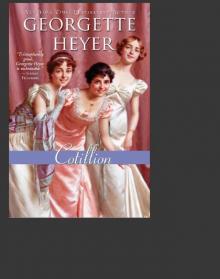 Cotillion
Cotillion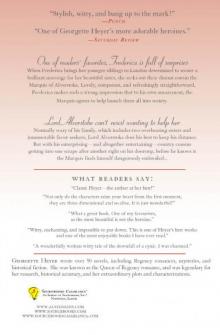 Frederica
Frederica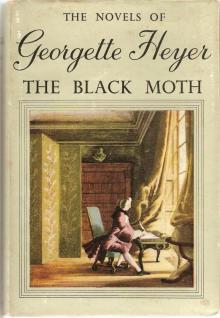 The Black Moth: A Romance of the XVIIIth Century
The Black Moth: A Romance of the XVIIIth Century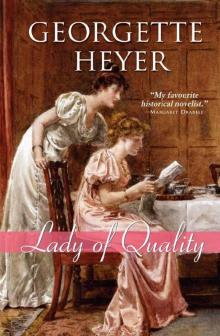 Lady of Quality
Lady of Quality Snowdrift and Other Stories
Snowdrift and Other Stories An Infamous Army
An Infamous Army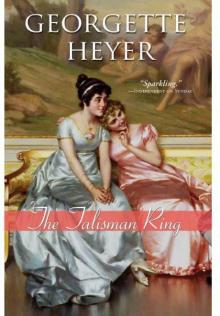 The Talisman Ring
The Talisman Ring Venetia
Venetia The Quiet Gentleman
The Quiet Gentleman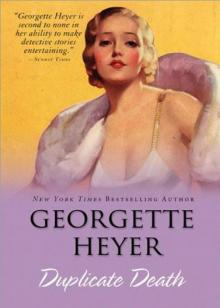 Duplicate Death
Duplicate Death Cousin Kate
Cousin Kate Black Sheep
Black Sheep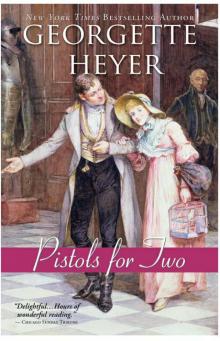 Pistols for Two
Pistols for Two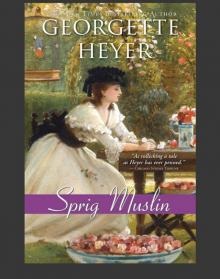 Sprig Muslin
Sprig Muslin No Wind of Blame
No Wind of Blame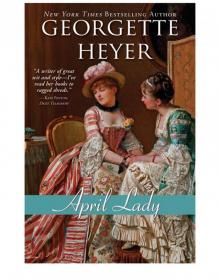 April Lady
April Lady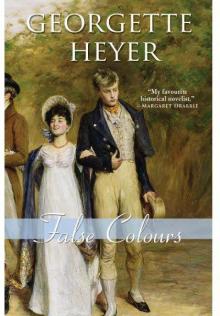 False Colours
False Colours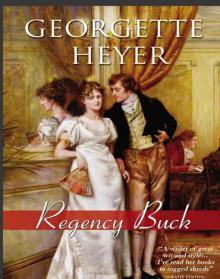 Regency Buck
Regency Buck The Toll-Gate
The Toll-Gate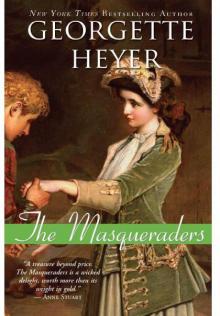 The Masqueraders
The Masqueraders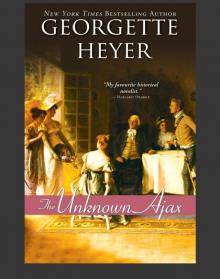 The Unknown Ajax
The Unknown Ajax The Grand Sophy
The Grand Sophy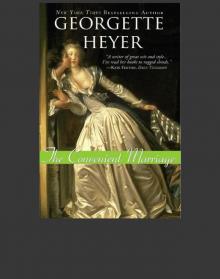 The Convenient Marriage
The Convenient Marriage Faro's Daughter
Faro's Daughter The Conqueror
The Conqueror The Foundling
The Foundling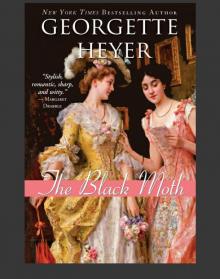 The Black Moth
The Black Moth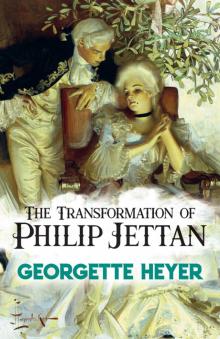 The Transformation of Philip Jettan
The Transformation of Philip Jettan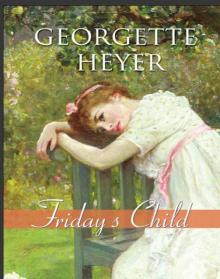 Friday's Child
Friday's Child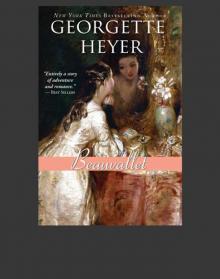 Beauvallet
Beauvallet They Found Him Dead
They Found Him Dead Charity Girl
Charity Girl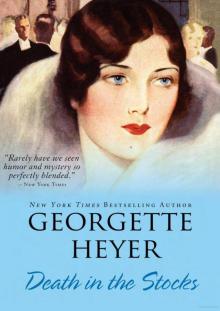 Death in the Stocks: Merely Murder
Death in the Stocks: Merely Murder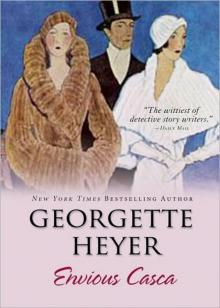 Envious Casca
Envious Casca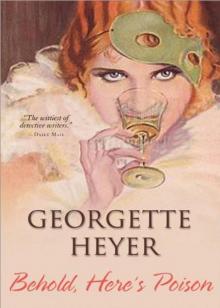 Behold, Here's Poison
Behold, Here's Poison Arabella
Arabella The Nonesuch
The Nonesuch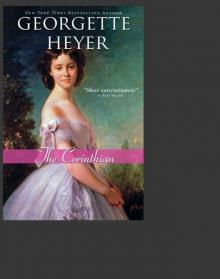 The Corinthian
The Corinthian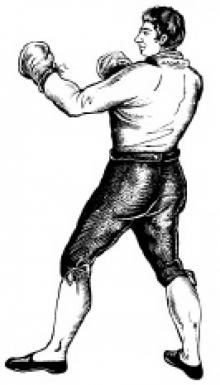 Jennifer Kloester
Jennifer Kloester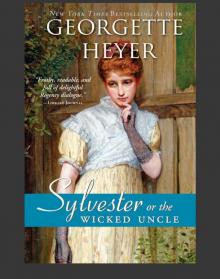 Sylvester
Sylvester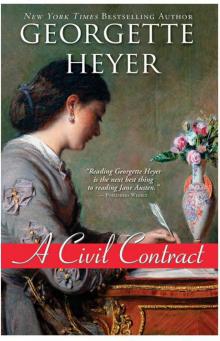 A Civil Contract
A Civil Contract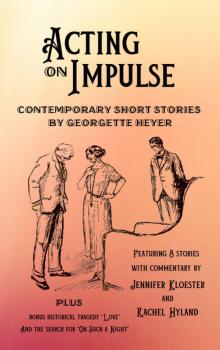 Acting on Impulse
Acting on Impulse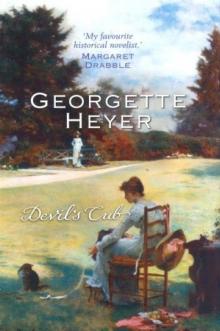 Devil’s Cub at-2
Devil’s Cub at-2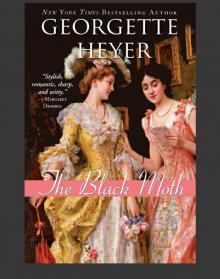 Black Moth
Black Moth Grand Sophy
Grand Sophy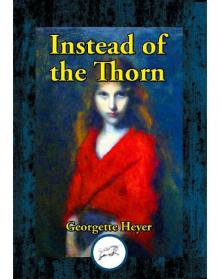 Instead of the Thorn
Instead of the Thorn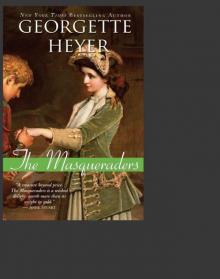 Masqueraders
Masqueraders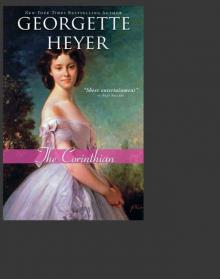 Corinthian
Corinthian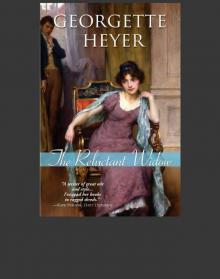 Reluctant Widow
Reluctant Widow